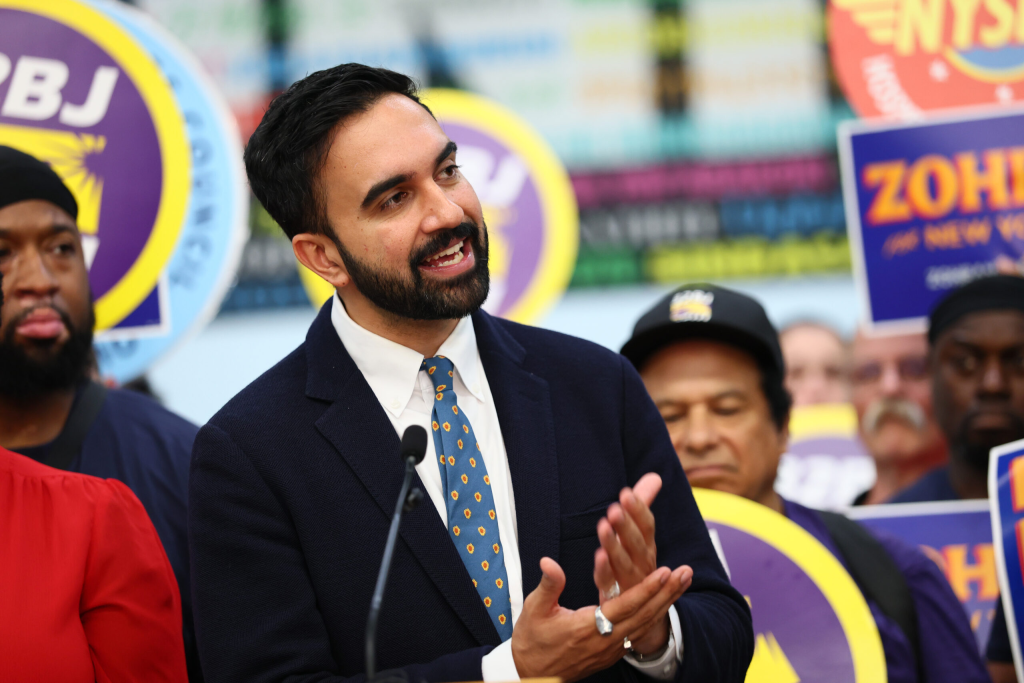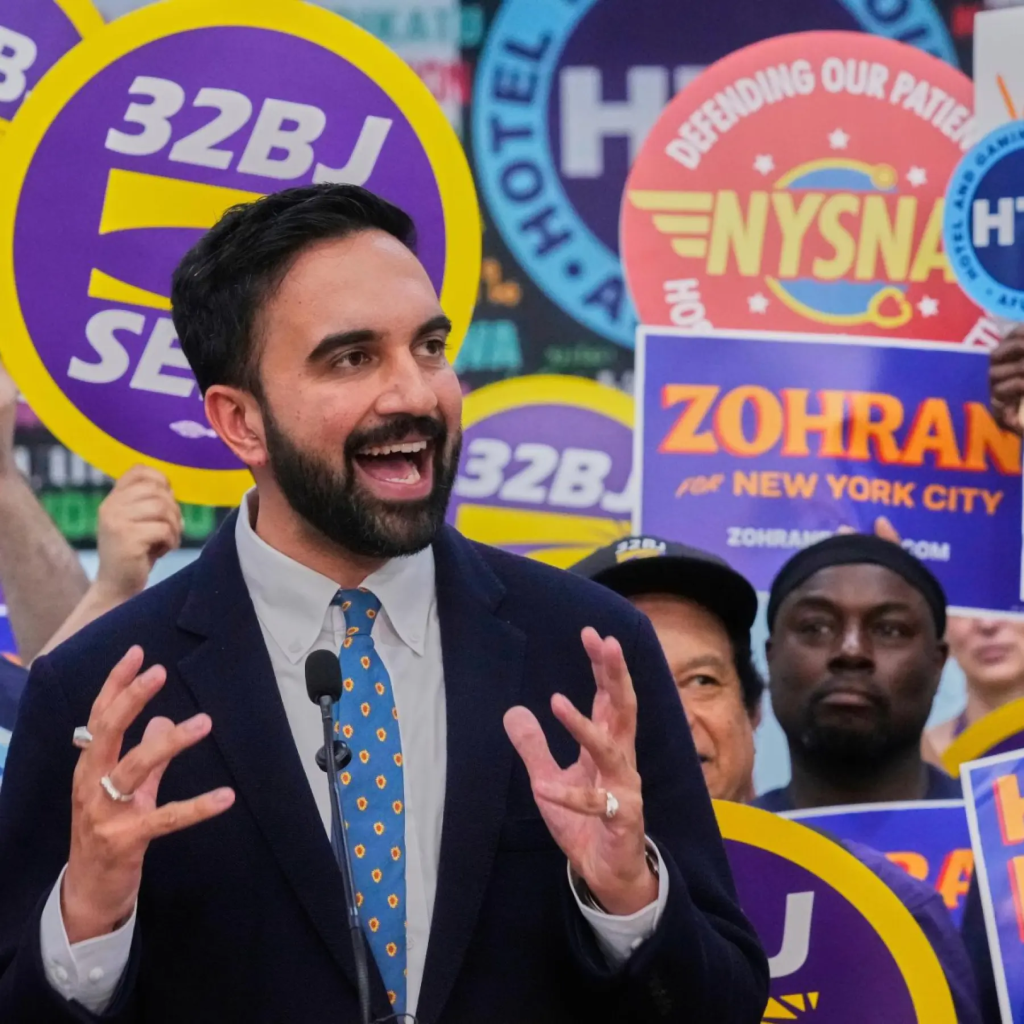On Election Day, Democrats across the country racked up a slew of impressive victories at the polls, with New York City Mayor-elect Zohran Mamdani seeming to garner the greatest excitement on cable news that night. “Did you see his speech?” a friend texted early Wednesday morning. “It was fire.”
Having since watched said speech, the word that comes to mind is prophetic. To a room full of supporters, Mamdani essentially announced that the hour of the poor had arrived. He proclaimed good news for laborers with “fingers bruised … palms calloused … knuckles scarred.” He promised justice for immigrants, trans New Yorkers, single mothers, and Black civil servants unceremoniously fired by President Trump. Mamdani may have Muslim and Hindu roots, but it was hard for this baptized Catholic not to hear echoes of her own Scriptures, nor to think of the Catholic Church’s teaching on the “preferential option” for the vulnerable.
I’m not alone in discerning something eschatological and not merely political in Mamdani’s rhetoric. Christians, Jews, and Muslims have mutually commented on the theological valences of his project to uplift the dispossessed, whether in Gotham’s warehouses or in Gaza. And data shows that Mamdani did well across faith communities—no easy feat, considering opponent Andrew Cuomo’s and others’ efforts to peg him as a jihadist who hates Jews.

Despite this, the press—and even many of his supporters—do not seem to take Mamdani seriously as a moral leader. They are too fixated on what he can do for the Democrat brand. This is a shame and not just for the mayor-elect. It betrays the fact that, nearly a decade into Trumpism and with the death toll still rising in Gaza, many Americans either don’t realize or won’t admit that the most pressing crises we face are substantially more moral than they are political. Greed, bigotry, ethno-nationalism—these will not be defeated at the ballot box. Rather, they will only be overcome by doing the hard work of encounter. Not by getting out the vote but by converting hearts to the truth that we are each other’s keepers.
This is not to say that Mamdani is explicitly styling himself as a religious leader. He doesn’t go around quoting the Quran the way his MAGA counterparts quote the Bible. And when he speaks of his Muslim faith, it is usually as a political signifier, rather than a religious one. He has talked, for instance, about enduring Islamophobia in the aftermath of 9/11, though not—to my knowledge—about the precise influence of Islam (or Hinduism) on his political thought. Still, we don’t need to know the specifics of his beliefs to appreciate that much of his message rings messianic, promising to enliven many with a hope that far exceeds the cheap promises of capitalism and ethno-nationalism.

In his victory speech, Mamdani spoke of “the impossible [being] made possible.” He quoted socialist Eugene Debs on the “dawn of a better day for humanity” and anti-colonialist Jawaharlal Nehru on the moment, “rare in history,” when the “soul of a nation, long suppressed, finds utterance.” These are not merely poetic images but eschatological ones. They have the power to put people in an expectant state, to conjure a quasi-apocalyptic fervor even among those who disdain organized religion, as Debs and Nehru did themselves. This is because the eschatological is not only concerned with some divinely composed Final Event but with bringing about paradise on earth. Karl Marx, who influenced Debs and Nehru, knew this better than anyone. He repudiated religion but kept its utopian end point.
It’s not just that Mamdani’s oration is so lofty; many Americans perceive a common project between their faith traditions and his democratic socialism. Anthony Annett, author of Cathonomics: How Catholic Tradition Can Create a More Just Economy and a host of the Moral Revolution podcast, told The New Republic that he is encouraged by Mamdani’s apparent rejection of free-market libertarianism in favor of the universal destination of goods. Citing the late Pope Benedict XVI, who wrote favorably of democratic socialism, Annett explained that the church likewise affirms “that the goods of the earth belong to everyone and that the right to private property should be considered a secondary right.”
Even though former New York Governor Cuomo won 61 percent of Jewish votes, Mamdani won over a substantial portion of non-Orthodox Jews, who seemed to think either (or both) his economic and anti-Israel message represented Jewish values. Many Jewish groups publicly endorsed Mamdani, undermining those, like the Anti-Defamation League, that tried to cast him as a cartoon menace to Jews, not merely someone with a duty to disavow the more controversial language of the anti-Zionist movement.
Presumably, it was Muslims among the crowd who cheered when, in his victory speech, the mayor-elect broke into Arabic, referencing the “Little Egypt” section of Astoria, Queens, known for its Muslim population. “We will fight for you because we are you,” Mamdani said. “Or, as we say on Steinway, ana minkum wa alaikum.” (This roughly translates: “I am from you and for you.”)
“It’s a distinctively Muslim approach to democratic socialism,” one scholar of Islam told The New York Times. “He has articulated an understanding of Muslimness that is tied to marginality, invisibility, not being seen.” Abdul El Sayed, a Democratic candidate for Senate in Michigan, added: “There’s a beautiful tradition in our faith that if you were to eat a full meal, and your neighbor could smell your meal and didn’t have [any], then you would be committing a sin. [So you must] ask yourself: What is wrong with sharing your food? What is wrong with sharing your resources?”
The abovementioned Times story being a notable exception, much of the press coverage of Mamdani has cast him solely as a political actor. “The Democrats have a new winning formula,” The Atlantic’s Derek Thomas headlined a story on Mamdani. “Here’s what Mamdani’s NYC mayoral win, and the rise of a democratic socialist, could mean for Democrats nationwide,” CBS News headlined another. No worries: he won’t succeed outside NYC, the centrist think tank Third Way promised its readers.
Even the Times’ Ross Douthat, who frequently writes on theological matters and who earlier this year published a book, Believe, on “why everyone should be religious,” confined his analysis to the electoral, saying that he does not expect Mamdani’s star to rise when, historically, City Hall has been “a springboard to nowhere.” This depiction of the mayorship as merely a foundation for Mamdani’s political career, rather than a promontory for mass uplift, betrays such a lack of imagination.
These framings don’t exactly surprise when even avowedly religious figures are reduced to political actors. Almost from the moment he came out on the loggia overlooking St. Peter’s Square, Pope Leo XIV has been styled as a foil to Trump, Vice President Vance, and their supporters. A contributor to this outlet claimed, for instance, that Leo’s first exhortation, Dilexi Te, demanded “a new humility” from conservative American Catholics.
To be sure, it does; and upon learning that the new pontiff’s exhortation re-centered Christianity around the poor, I got my own copy, highlighted its uncompromising critiques of neoliberalism and nativism, then fired them off to Trump-voting Catholic relatives. But to think only of the way Dilexi Ti rebukes “trads” is to miss its appeals to the rest of us. One of the document’s most countercultural messages is that poverty can be spiritual, as well as material. I take this to mean that we have as much responsibility to the hard-hearted as to the empty-stomached.
And this is where I worry that Mamdani may ultimately come up short. On the one hand, he is willing to sit down with his critics, even to change his mind about matters, such as the prudence of the slogan “Globalize the Intifada,” which many Jews hear as a call to violence, even though it means something different to many pro-Palestinian activists. On the other, he seems to conceive of the “soul of a nation” too narrowly—too materially.
Notably, while his victory speech promised good things to those who did not vote for him, it was implied to be in their capacity as tenants and laborers. And on the topic of Islamophobia, Mamdani said there “is no problem too large for government to solve.” This did not send me into a panic as it did the folks at Fox News, but it did give me pause. Not all of us believe, in a Marxist spirit, that hate can be explained away as disordered economic relations or redressed by state-sponsored reeducation, such as Mamdani’s proposed hate crime prevention program. Some problems are too large for the state, even if the state can help create the conditions for their amelioration.
I have to confess that I also winced when Mamdani wished Cuomo well in private life only to express a desire to never again have to utter his name. Certainly, Mamdani has every reason to resent his opponent for leveling such insidious attacks; and I too hope to never see Cuomo’s name on another ticket. But here too Mamdani sells the problem short. Justice isn’t achieved by banishing the bad guys to the shadows but by building a culture in which they can’t thrive. It’s not clear how Mamdani will accomplish the latter.
Were the press to take Mamdani more seriously as a moral leader, not simply a political one, perhaps he would be pushed to speak more expansively. Under capitalism, with its relentless logic of exchange, and at a time when vengeance has its own hashtag (#FAFO, or “fuck around and find out”), it can be hard even for nonpoliticians to scheme past vanquishing one’s foes and reclaiming the halls of power. But if we don’t dream beyond the political, isn’t it only a matter of time before those halls are reoccupied by those once-vanquished foes?
Already, many on the left seem elated to have found their messiah, one whose charisma can compete with Trump’s. I sure hope Mamdani energizes our ranks. But unless he can counter Trump’s world-class politics of resentment with a desire that disarms, it may be more of the same.
Leave a Reply